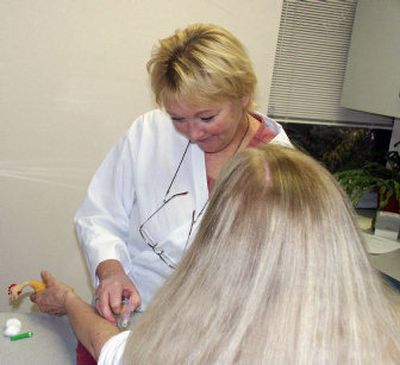Medical professional known for gentle touch

February, noted for Valentine’s Day and, hopefully, the last of the cold weather in North Idaho, also is American Heart month – the perfect time to focus on a job critical to the business of health. Barb Smith, 52, is a phlebotomist for Pathology Associates in Coeur d’Alene, taking blood samples primarily for tests requested by cardiologists and gastroenterologists. She is known for her gentle touch and a great record of nonfainting patients.
This profession has a long and interesting history. According to Wikipedia, the Internet encyclopedia, “phlebotomy” was the medical practice from antiquity to the late 19th century of withdrawing large amounts of blood. Known as “bloodletting,” it was thought to prevent or cure illness and disease in early medicine and was usually recommended by physicians and carried out by barbers. The procedure was popular in early American medicine, where Benjamin Rush, a doctor and signer of the Declaration of Independence, recommended very high levels of bloodletting.
George Washington died of a throat infection in 1799, after having almost 4 pounds of blood withdrawn following a horseback-riding accident. Bloodletting was thought to be a contributing factor to the former president’s death and the process lost favor in the 1800s.
Phlebotomist’s today are well-trained healthcare professionals who collect small quantities of blood to perform blood tests as an important medical diagnostic tool. Blood tests help detect many health problems, such as diabetes and cholesterol levels (high cholesterol can lead to heart disease). Samples are taken either from a vein or from an artery. As a variety to blood work, Smith also performs fecal-occult screening for the gastroenterologist’s office.
What is your job title? Phlebotomist.
How long have you been doing this? “Twenty-six years, with 12 years for Pathology Associates.”
How did you choose this line of work? “I’ve always liked the medical field.”
Are you paid: (a) well; (b) more than you are worth; (c) slave wages, (d) could be better? ” ‘A’, but could be ‘D.’ “
What is the best thing about your job? “Getting to know my regular patients personally. I’ve developed many close relationships through the years.”
What is the worst thing about your job? “When someone I’ve known for a long time dies. Also, with five gastroenterologists in the office, we do a lot of stool tests that I could do without.”
Do you plan on doing this job (a) until retirement; (b) until something better comes along? “A.”
Do you have any on-the-job funny stories? “One time I had a very elderly, hard-of-hearing man sent over after his appointment with the doctor. I asked him to have a seat. I turned my back for a minute to prepare my drawing supplies. When I looked back, he was taking his pants off. I said loudly, ‘No, No,’ I just need your arm!”
Any bad experiences (please elaborate)? “Not really, except when we used to use glass tubes and one would break in the centrifuge. Blood and broken glass spun at 3,500 rpm is quite a mess!”
If there was a movie made about you and your job, what actor should play you? “Ellen DeGeneres.”